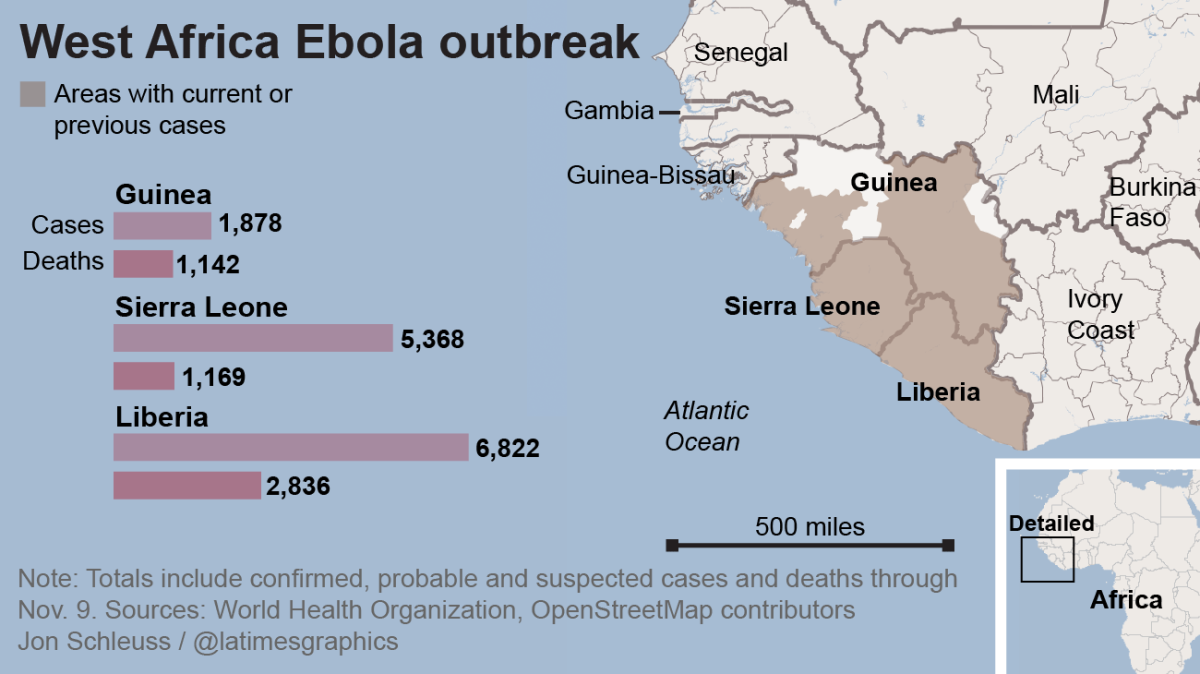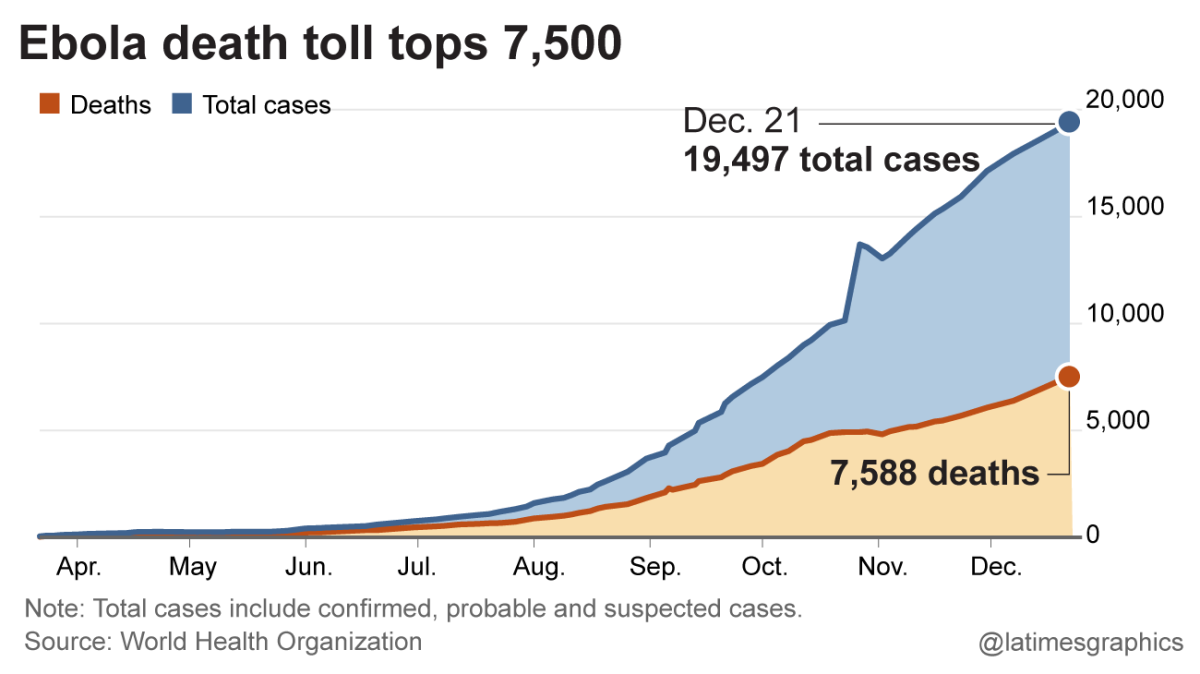Story So Far: Unprecedented Ebola outbreak in West Africa: What you need to know
- Share via
The latest Ebola outbreak has reached a crisis point in West Africa. Here are some important things you need to know to understand it.
Why is this outbreak so significant? Full story >
The Ebola outbreak is the deadliest in history, according to the World Health Organization and the United Nations. Doctors Without Borders has called the current wave “unprecedented” in geographic spread. It is also the first outbreak to hit West Africa and, unlike past outbreaks, has moved beyond remote villages to hit dense urban areas hard.
Before this year, the deadliest Ebola outbreak occurred in 1976, when the disease killed 280 people in the Democratic Republic of Congo. Since March of this year, more than seventeen times that many - almost 5,000 people - are believed to have died from Ebola in West Africa.
In June, Bart Janssens, operations director for Doctors Without Borders, said that the outbreak was “totally out of control” and that the organization was struggling to keep up with the disease. At the time, there were 528 total confirmed and suspected cases of Ebola. Now there are 26 times as many.
When was Ebola first discovered?
Ebola was documented for the first time in 1976 in two simultaneous outbreaks, one in the Democratic Republic of Congo and the other in a remote region of Sudan.
Experts don’t know for sure the origins of the disease, but they think that fruit bats are probably the natural hosts for the virus.
Monkeys and gorillas have also been known to infect humans, but the WHO says it believes they are merely “accidental” hosts.
When and where did this outbreak begin?
The West African country of Guinea first reported Ebola cases to the WHO in March, but the first case has been traced back to December. Initially, the infections were contained in a rural area in southeastern Guinea, but the disease quickly spread to the capital and across the border to Sierra Leone and Liberia.
On Aug. 26, the Democratic Republic of Congo reported that a separate outbreak of Ebola had occurred in a rural area of Equateur province. According to the WHO, the outbreak there began with a pregnant woman who butchered a bush animal. Since then, 66 suspected Ebola cases, including 49 deaths, have been identified, many of them family members or healthcare workers that were in contact with the pregnant woman. WHO and Congo officials have emphasized that this is a completely separate strain of Ebola, and that the outbreak is unrelated to the West African crisis.

How many people have died?
At least 13,703 people are suspected to have been infected in five countries, and of those, at least 4,922 have died, according to the WHO. From Oct. 21 to Oct. 27 alone, more than 3,000 cases were reported. The WHO said the surge in numbers was likely due to previous underreporting.
Patrick Sawyer, who lived and worked as a government contractor in Liberia, is the first American to have died in the outbreak.
In a separate outbreak of what officials have said is a different strain of the Ebola virus in Congo, 49 people are believed to have died from the disease.

Is there a cure for the Ebola virus?Full story >
No, there is no cure or vaccine to combat Ebola. In some outbreaks, it’s been known to kill up to 90% of those infected. Researchers are still in the very early stages of developing a treatment, and the U.S. Food and Drug Administration says efforts to create one probably won’t bear fruit until 2015. Many of the people who become infected are simply quarantined and given IV drips for hydration.
American doctor Kent Brantly and missionary Nancy Writebol, who both contracted Ebola while treating patients in Liberia, were given doses of experimental drug ZMapp, which had never been tested on humans. The revelation raised serious ethical questions regarding whether untested drugs should be used in outbreaks, but a WHO panel later said it had determined it was ethical to use the drug on Ebola patients, and that it was considering other experimental treatments for "compassionate use" in the outbreak, including three antiviral medicines and two vaccines.
The experimental drug was later given to a Spanish priest, three African healthcare workers and a British nurse. Of the seven who have taken the drug, two have died.
Other patients treated for Ebola in U.S. hospitals have also received plasma transfusions from Ebola survivors, and doses of experimental drugs brincidofovir and TKM-Ebola.
This summer, the U.S. National Institutes of Health said it would begin human tests of a vaccine developed jointly by the U.S. military and GlaxoSmithKline, and also unveiled a plan to speed development and approval of ZMapp.
How is the Ebola virus spread among humans?
You can get Ebola by coming into direct contact with blood, organs or bodily fluids from an infected person or by touching surfaces contaminated with those fluids.
According to the WHO, men who have recovered from Ebola can still spread the virus through their semen up to seven weeks later. Humans can also contract the disease by coming into contact with infected animals such as chimpanzees, gorillas and fruit bats.
The incubation period of Ebola can last two to 21 days, meaning a person may not show symptoms of the disease until up to three weeks after becoming infected.
What are the symptoms?
People who are infected experience sudden fever, intense weakness, muscle pain and headaches, along with vomiting and diarrhea. The disease can later cause kidney and liver failure, as well as internal bleeding.
Who is most at risk for infection?
Health workers, family members in close contact with infected people, and mourners who have close contact with infected bodies are most susceptible to the disease. Hunters in the forest who may encounter dead animals could also contract the disease.
The WHO has called the number of medical staff infected during this outbreak "unprecedented."
Sierra Leone's lead doctor in the fight against Ebola died from the disease, as did a top Liberian health official.
An American doctor who was treating Ebola patients in Liberia and another U.S. volunteer are among those who tested positive for the deadly virus, and were evacuated to and treated in the United States. Both were released from a hospital after doctors said they were Ebola-free.
Seven other people have been treated in U.S. hospitals for the disease. Of those, three were said to have been working with Ebola patients in West Africa before getting sick, and two were nurses who helped treat Liberian national Thomas Eric Duncan in Texas.
Has the disease been contained geographically? Full story >
Mali was the latest country to report a new case of the Ebola virus.
Before that, the WHO had said the spread of the disease to Senegal and Nigeria, the most populous country in sub-Saharan Africa, represented a "significant development in the course of this outbreak." Both countries have since gotten their outbreaks under control, and their outbreaks have been declared over.
On Aug. 18, the WHO urged countries affected by Ebola to screen all passengers leaving the country at international airports, seaports and major land crossings to help control the disease, but has not recommended any ban on international travel or trade.
Liberia announced that it had closed most of the country’s land borders and restricted public gatherings and quarantined communities with outbreaks in an effort to stem the disease’s spread. South Africa and Kenya recently joined the growing number of countries that have closed borders to noncitizens traveling from West Africa over Ebola fears.
Early on, the country of Senegal closed its borders with Guinea as Ebola gained traction there. Officials have announced they will open a "humanitarian corridor" but have not elaborated.
The WHO has expressed concern over the increasing number of travel bans in the region, saying the closure of borders and canceling of flight service could further exacerbate the crisis.
President Obama has also said he doesn't believe travel bans would be effective in preventing Ebola cases in the United States, but U.S. officials have taken some measures to guard against Ebola. All travelers arriving from the Sierra Leone, Guinea, or Libera must go through 5 designated U.S. airports and undergo additional entry screening for fever and other symptoms.
In addition, Secretary of Defense Chuck Hagel announced Oct. 29 that all U.S. military personnel returning from Ebola missions will undergo a supervised 21-day quarantine. Several states have also instituted mandatory quarantines for certain travelers returning from West Africa, including medical personnel exposed to Ebola patients and others who may have had close contact with the infected people.
What are some of the challenges public health officials are facing in keeping the Ebola outbreak from spreading? Full story >
A weak public health infrastructure and certain cultural practices and traditional beliefs have helped the disease gain traction.
Common burial practices include washing of loved ones' bodies in mourning, which is contributing to the spread of the disease, because dead bodies are often some of the most contagious, the WHO says.
Also, many healthcare workers initially reported that villagers in remote areas were often suspicious of medical staff, and even blamed them for causing the disease, leading some aid organizations to temporarily suspend operations because of safety concerns. Since then, Doctors Without Borders has said it has gained full access to all affected areas.
In dozens of cases, doctors have reported that infected people have run away or evaded treatment, prompting officials in Sierra Leone and Liberia to make it a criminal offense to hide a person showing symptoms of the disease.
The Associated Press reported that on Aug. 16, residents of a Monrovia slum attacked an Ebola quarantine center, where people were being monitored for possible infection. Witnesses said the residents were angry that patients were being brought in from other parts of the city. More than 37 patients left during the raid, the AP said, and looters stole bloody sheets and mattresses that could have been contaminated with the virus. All the patients were later said to have returned to quarantine, but the government temporarily cut off all travel in and out of the neighborhood.
Could the Ebola virus spread in North America or other parts of the world?
The CDC said it’s unlikely Ebola would spread in the United States, but emphasized the importance of healthcare workers in the U.S. identifying and isolating sick travelers returning from the region.
Although it's possible that a person could travel abroad before realizing he or she is infected, previous research has found little evidence to support the idea that Ebola would be spread by plane travel.
For example, a report by the European Center for Disease Prevention and Control cited a case study in 1996 when a man from Gabon with clear symptoms of Ebola traveled to Johannesburg, South Africa, and sought medical treatment. He didn't infect anyone during his journey, the report said.
Sign up for Essential California
The most important California stories and recommendations in your inbox every morning.
You may occasionally receive promotional content from the Los Angeles Times.








